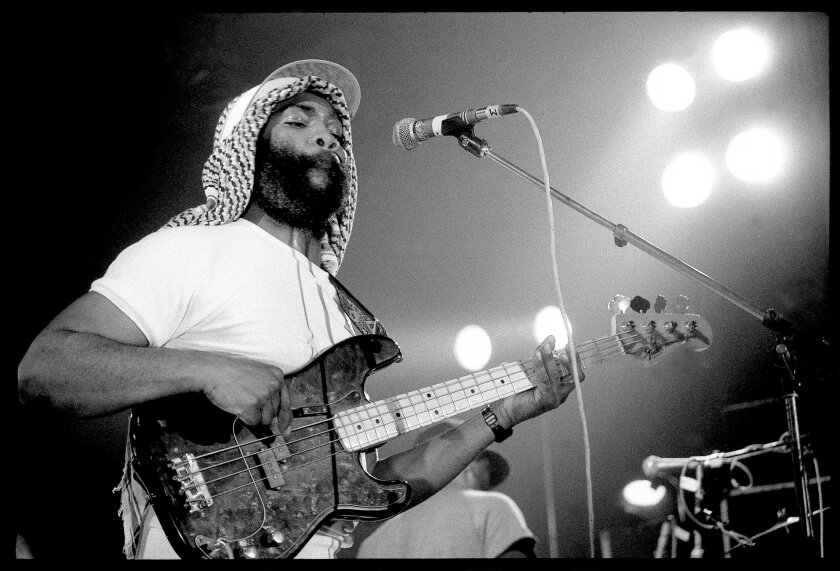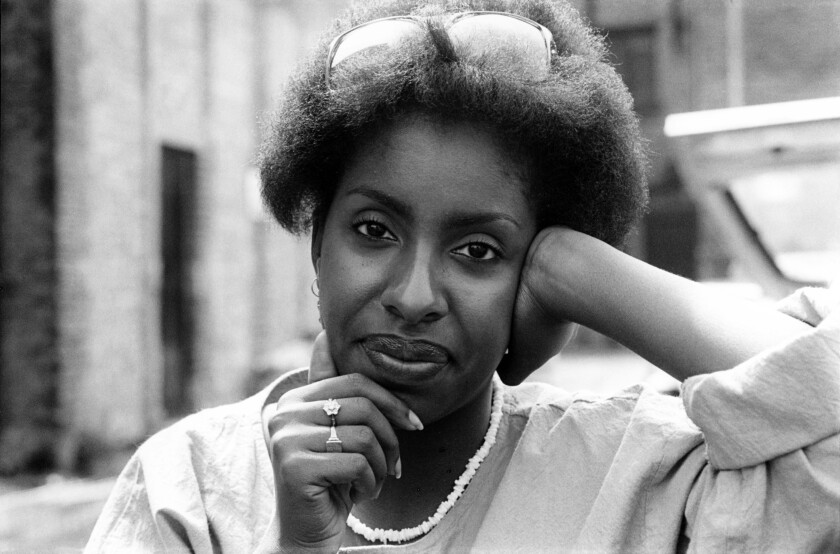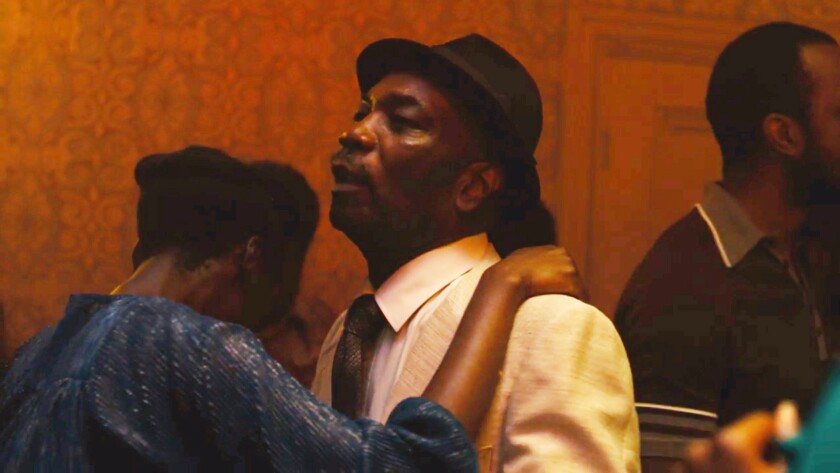A music wants to be outstanding if it’s going to occupy 10 minutes of a 69-moment film.
Steve McQueen’s “Lovers Rock,” one movie in the Oscar-nominated director’s five-element “Small Axe” anthology collection for Amazon Studios, tracks the class of a “blues party” thrown by to start with- and next-era West Indian immigrants in an condominium in London in 1980. Halfway through the night time, one of the DJs performs Janet Kay’s 1979 strike “Silly Video games,” a sweetly craving ballad that typifies the sentimental variant of reggae for which the movie is named.
What happens next constitutes one of the most client and loving celebrations of tunes at any time captured on movie. The DJ stops the audio so that the gradual-dancing partygoers can sing the entire music a cappella, providing it the sacred excellent of a hymn. It is a spontaneous ritual of link and endurance in a hostile world.
In the group, participating in the party hosts’ upstairs neighbor, is the gentleman who wrote and produced “Silly Online games.” Viewing a home comprehensive of actors fewer than 50 % his age sing his music 40 yrs later, Dennis Bovell was conquer with emotion.
“I was keeping again the tears,” suggests Bovell, a garrulous 67-12 months-previous with seemingly flawless remember of each and every report he’s ever designed. “The track turned a sort of religious and a type of protest: the authorities enjoying silly game titles with the persons. I imagined, Steve, how did you see that? I under no circumstances observed that song as a protest.”
“‘Silly Games’ was in my head from the get-go,” McQueen suggests in an email interview. “In quite a few techniques, it was the foundation for the full film. It is about intimacy and wish and inquiring anyone to take off their mask.”

Dennis Bovell performs in 1984. In Steve McQueen’s “Lovers Rock,” Bovell suggests that “Silly Games” “became a sort of non secular and a variety of protest.”
(David Corio / Redferns)
The tune started with a gimmick. In 1977 Bovell observed a cassette-tape industrial in which Ella Fitzgerald hit a observe so high that it shattered a glass. He created “Silly Games” to peak with these kinds of a showstopping be aware and observed in 19-year-previous Janet Kay a singer with the range to pull it off. Bovell then created, with drummer Angus “Drummie Zeb” Gaye, an modern rhythm that blended reggae with disco, Afrobeat and West African highlife. When “Silly Games” was reissued in June 1979, it arrived at No. 2 in the U.K. Top 40 and became the defining anthem of lovers rock.
“I realized that every single youthful woman from then on would be stood in entrance of their mirror with their hairbrush, miming that note,” Bovell states. “And it arrived to move!”
At the time of the movie’s fictitious celebration, the serious Bovell was a single of the U.K.’s busiest producers, with shoppers together with the poet Linton Kwesi Johnson, the put up-punk bands the Slits and the Pop Group, the Japanese composer Ryuichi Sakamoto and Franco Rosso, the director of “Babylon,” the to start with film to depict the U.K.’s sound method society. (Audio methods, which originated in Jamaica, are substantial mobile DJ operations.)
He was also a key participant in the activist movement Rock In opposition to Racism, mingling with punk bands this sort of as the Clash. Bovell’s function epitomized multiracial collaboration and solidarity in a time of civil unrest, police brutality and far-suitable violence.
McQueen describes Bovell as an “incomparable” figure in British audio. “He is a man or woman who crossed genres and also invented his possess. He is a environment of knowledge and a fantastic producer, so therefore a wonderful communicator. He is a person of our most useful Londoners.”
Bovell was born in Barbados in 1953 and moved to England in 1965 to sign up for his father, a bus driver, and mom in South London. Though even now in his teens, he launched his possess reggae group, Matumbi, and seem technique, Sufferer, but fell sufferer to vindictive racist policing, he claims.
On Oct. 13, 1974, Bovell was DJing at a soundclash among 3 rival seem devices in a club in northwest London when a fight broke out concerning revelers and law enforcement. Bovell was falsely accused of finding on the microphone and exhorting the crowd to assault the law enforcement. When he turned himself in to the law enforcement, figuring that he experienced almost nothing to worry, he was accompanied by Rhodan Gordon, the activist performed by Nathaniel Martello-White in “Mangrove,” a further of McQueen’s “Small Axe” motion pictures.
Right until he was arrested, Bovell had been skeptical of pals who claimed to have been framed for crimes they didn’t commit. “Now it was happening to me,” he states. “It was like remaining released into some nightmare. It made me know that the law enforcement are damn liars.”
Throughout two trials more than nine months, most of the law enforcement witnesses stated that the location was way too dim for them to see obviously, but Bovell claims two falsely claimed that it was brightly lit and he was identifiable. “Police officers came and perjured them selves,” he suggests. “I insisted that they provide a polygraph take a look at into the court docket and the judge retorted, ‘Do you hope me to consider that police officers lie underneath oath?’ I explained, ‘Mate, carry the polygraph and we’ll discover out.’ But he dismissed that.”
Bovell was located guilty and put in six months in jail in advance of he was freed on charm. The only good matter to arrive out of his ordeal, he says, was the songs he wrote for Matumbi in his mobile.

“Silly Games” singer Janet Kay in 1984.
(Leon Morris / Redferns)
In the early 1970s, the U.K.’s West Indian neighborhood was cautious of homegrown reggae. “It was constantly being ridiculed: ‘It doesn’t audio right,’” Bovell states. “I set out to disprove the myth that reggae could not appropriately be produced in the U.K.”
He circumvented this stigma by releasing productions anonymously and stamping significant holes in the center of vinyl singles to make them resemble Jamaican imports. A single of them, Louisa Mark’s 1975 ballad “Caught You in a Lie,” was embraced by Lloyd Coxsone’s audio procedure, which prided by itself on taking part in strictly Jamaican music. “It gave me big self confidence to know that I could make reggae in London if they didn’t know it was me,” Bovell says. He then recorded dub reggae incognito less than the alias 4th Road Orchestra, with comparable results. “It’s not prejudiced by who wrote it or who’s enjoying on it or wherever it was recorded. Possibly you like it or you never.” By the time an inquisitive journalist uncovered his charade, no person cared.
In 1976, a Jamaican-born entrepreneur named Dennis Harris offered his corner retail outlet and founded a studio in Brockley, South London. “He named me up one particular working day and stated, ‘I’ve just developed the studio, here’s the keys, you’re the engineer,’” Bovell remembers, laughing. “He did not talk to me, he explained to me.” Named Lover’s Rock for a track by Augustus Pablo, Harris and Bovell’s label specialised in like tracks, sung by females and motivated by American R&B, as an substitute to the overwhelmingly male, stridently political reggae coming out of Jamaica.
“Sound devices experienced begun [saying] ‘This is enthusiasts rock,’” Bovell claims. “That would be telling the audience that this tune is a smooch. This is a chance to get correct up shut to that guy or female that you needed to. That was the name now supplied to the style of the new music that we in London were building, that includes mostly feminine singers.”

Dennis Bovell in a cameo in “Lovers Rock.”
(Amazon Studios)
Even though enthusiasts rock was apolitical, Bovell was not. In December 1976, Matumbi played the initially-ever live performance for Rock Towards Racism, the grass-roots corporation established up in reaction to a shockingly racist onstage rant by Eric Clapton. “We wished to sort a modern society that was heading to present that all people in England wasn’t of the identical opinion as him,” Bovell suggests.
In 1978, Bovell struck up an enduring working romance with Johnson, turning a poet into an worldwide touring artist who decried injustice in stern Jamaican patois around weighty rhythms on tracks these as “Inglan Is a Bitch” and “Fite Dem Back.” “Linton’s poetry is genuine,” Bovell says. “It’s not ‘Baby, I like you.’ And I felt that I necessary to align myself with some of these realities for the reason that I had lived by means of most of them.”
As a producer and remixer, Bovell was sought out by bands who “wanted to perform their punk as heavy as reggae was,” recording with artists such as Orange Juice and the Raincoats in the 1980s. He however works with Johnson and remixes artists such as Joss Stone and Arcade Hearth.
Now Bovell is having fun with the unanticipated satisfaction of observing a new technology drop in appreciate with “Silly Video games.” Not too long ago, he was standing in a takeaway restaurant when he read a young woman’s phone enjoy “Silly Games” as a ringtone. “I want to say to her, ‘That’s my tune,’” he remembers. “If I mentioned that, she almost certainly would not imagine me.”

%2520(1).png)


